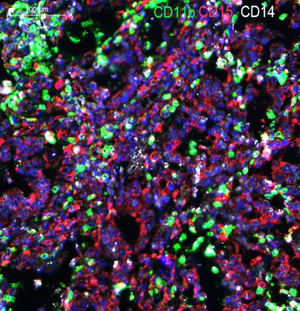| Reactivity: | H |
| Applications: | IHC/IF |
| Host Species: | Mouse |
| Clonality: | Monoclonal |
| Gene Name: | Monocyte differentiation antigen CD14 (Myeloid cell-specific leucine-rich glycoprotein) (CD antigen CD14) [Cleaved into: Monocyte differentiation antigen CD14, urinary form; Monocyte differentiation a |
Gene ID: | 929 |
Immunogen: | Synthesized peptide derived from human CD14 |
Uniprot ID: | P08571 |
Source: | Mouse/IgG2b, Kappa |
Concentration: | 1 mg/ml |
Purity: | The antibody was affinity-purified from mouse ascites by affinity-chromatography using specific immunogen. |
Product Usage Information
IHC/IF | Human | 1: 200-1: 500 | gastric cancer |
Background
CD14 is a 55 kDa GPI-anchored glycoprotein that is constitutively expressed on the surface of mature monocytes, macrophages, and neutrophils. CD14 also serves as a multifunctional lipopolysaccharide receptor, and is released to the serum both as a secreted and enzymatically cleaved GPI-anchored form. CD14 binds lipopolysaccharide molecule in a reaction catalyzed by lipopolysaccharide-binding protein (LBP), an acute phase serum protein. The soluble sCD14 can discriminate slight structural differences between lipopolysaccharides and is important for neutralization of serum allochthonous lipopolysaccharides by reconstituted lipoprotein particles. Further, CD14 has been shown to bind apoptotic cells, and can affect allergic, inflammatory and infectious processes. Alternative splicing results in multiple transcript variants encoding the same CD14 isoform. Diseases associated with CD14 dysfunction include mycobacterium chelonae infection and Croup.
Images
 |
Immunohistochemistry analysis of paraffin embedded human gastric cancer using CD14 (GB14023) at dilution of 1: 200 |
Storage
| Storage | Store at -20°C for one year. Avoid repeated freeze/thaw cycles. |
| Storage Buffer | Liquid in PBS containing 50% glycerol, 0.5% BSA and 0.02% sodium azide. |
